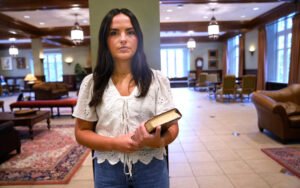Faith vs. Medical Care: The Tragic Case of Rachel and Joshua Piland

Rachel and Joshua Piland
Introduction to the Case
The tragic story of Rachel and Joshua Piland serves as a poignant example of the complex intersection between faith and medical care. In this case, the couple’s strong religious convictions led them to make the heartbreaking decision to forgo essential medical treatments for their newborn daughter, who was diagnosed with a critical health condition shortly after birth. Their profound belief in divine healing overshadowed the stark realities of the medical crisis at hand, ultimately resulting in devastating consequences.
Rachel and Joshua, who adhered to a strict interpretation of their faith, chose to rely solely on prayer and spiritual intervention rather than seek conventional medical assistance. This decision was not made lightly; it stemmed from their deeply held belief that faith could provide all necessary healing. Tragically, their newborn daughter’s condition worsened without medical intervention, leading to her untimely death. This heart-wrenching loss has sparked a national discourse on the responsibilities of parents regarding medical care, particularly when religious beliefs come into conflict with established medical practices.
The couple now faces legal repercussions for their decision, as the state’s interest in protecting the welfare of children has been called into question. Their case raises significant ethical issues about parental rights, religious freedom, and the crucial role of medical care in safeguarding the health of vulnerable individuals. As this case unfolds, it prompts society to reflect on the delicate balance that must be struck between respecting individual faith and ensuring access to necessary healthcare. The Pilands’ situation serves as a potent reminder of the potential consequences that can arise when faith takes precedence over medical necessity.
Understanding Jaundice in Infants
Jaundice in infants is a common condition characterized by a yellowing of the skin and the whites of the eyes, resulting from an excess of bilirubin in the bloodstream. Bilirubin is a substance produced during the normal breakdown of red blood cells. In newborns, the liver, which processes bilirubin, is often immature, leading to elevated levels of this pigment. Several factors can contribute to jaundice, including prematurity, blood type incompatibility, and certain infections.
The primary symptoms of jaundice include the aforementioned yellowing, which typically first appears on the face and then may progress to the chest, abdomen, and legs. Monitoring bilirubin levels is crucial as they can indicate the severity of the jaundice. If untreated, high bilirubin levels can lead to more serious health complications, including kernicterus, a rare but serious condition where excess bilirubin enters the brain and can lead to permanent damage.
Common medical interventions for jaundice in infants include phototherapy, where the baby is placed under special lights that help break down bilirubin in the skin. This procedure is generally safe and effective, requiring only a few hours to several days of treatment, depending on the severity of the condition. In more severe cases, exchange transfusions may be necessary, where some of the infant’s blood is replaced with donor blood to rapidly reduce bilirubin levels.
Jaundice can pose significant risks to newborns; thus, it is vital for parents and caregivers to seek prompt medical attention if they observe any symptoms. Timely diagnosis and intervention can prevent serious health complications, ensuring that infants receive the appropriate care they need during this vulnerable stage of life.
The Role of Faith in Parental Decisions
The intersection of faith and parental decision-making often presents complex challenges, particularly in medical contexts. In the case of Rachel and Joshua Piland, their religious beliefs significantly influenced their choices concerning medical care for their children. Rooted in their Christian faith, the Pilands held a firm conviction that divine intervention could supersede conventional medical practices. This perspective is not uncommon among certain religious groups, where prayer and faith-based healing are viewed as primary remedies.
For many parents, religious beliefs serve as a guiding framework for important decisions, including those related to health care. Such beliefs can instill a sense of hope and assurance that spiritual interventions may yield better outcomes than traditional medicine. In moments of medical crisis, parents may face profound dilemmas when they must choose between adhering to their faith and following the advice of medical professionals. This dichotomy is particularly evident in cases where medical opinions advise immediate intervention, yet parental instincts, shaped by faith, lean toward alternative or faith-oriented healing practices.
The Pilands’ situation illustrates the potential conflicts that arise when personal beliefs clash with medical recommendations. While their unwavering faith provided them with solace and direction, it also led to tragic consequences for their children. The community often experiences tension when parents prioritize faith over medical advice, raising ethical questions about the rights of children in faith-based households. A careful examination of such cases is essential, highlighting the complex nature of parental rights, religious freedom, and the duty of care in safeguarding children’s health.
Ultimately, the case of Rachel and Joshua Piland serves as a cautionary tale, reminding society of the need to approach the delicate balance between faith and medical care with sensitivity and understanding.
The Events Leading Up to the Tragedy
The tragic story of Rachel and Joshua Piland centers on a series of events that culminated in the heartbreaking loss of their infant daughter. In the early days following her birth, the couple noticed alarming signs of jaundice in their newborn. These signs included a noticeable yellowing of the skin and eyes, a common condition that affects many babies but can require medical intervention if severe. Despite this, the Pilands, who held strong religious beliefs, relied on prayer and faith for healing rather than seeking medical assistance.
As the days progressed, the jaundice persisted, and the baby’s condition did not improve. Friends and family members expressed their concerns, urging the Pilands to consider consulting a healthcare professional. However, the couple remained committed to their faith-based approach, believing that their daughter’s health would improve through divine intervention. The conflicting advice from loved ones and their unwavering belief created a complex decision-making landscape for the parents.
After several days of fruitless prayers, the situation took a tragic turn. The infant’s condition deteriorated, and she began displaying further symptoms of distress. At this point, the couple faced a critical decision: to continue their faith-based beliefs or to turn to medical care for their child’s declining health. Unfortunately, this pivotal moment was marred by indecision and their deep-seated convictions. Ultimately, the delay in seeking immediate medical assistance led to irreversible consequences, underscoring the importance of informed decision-making when it comes to health. The heartbreaking outcome sparked widespread discussions about the intersection of faith and medical care, emphasizing the need for a balanced approach to health and wellness.
Legal Consequences for the Pilands
The case of Rachel and Joshua Piland has raised significant legal concerns related to their decision to rely exclusively on faith-based healing for their child, ultimately resulting in a tragic outcome. The couple is currently facing serious charges arising from allegations of medical neglect. Law enforcement authorities have charged them with child endangerment, which is a serious felony in many jurisdictions. This charge stems from their apparent failure to seek necessary medical care for their child, whose conditions deteriorated due to a lack of proper treatment.
As the judicial process unfolds, the Pilands are navigating a legal system that will evaluate the intersection of their religious beliefs and the expectations of medical care mandated by law. Their case not only scrutinizes their personal choices but also brings attention to the broader implications of similar cases involving faith healing and medical neglect. Some legal experts argue that decisions driven by religious convictions should not exempt individuals from fulfilling their parental duties, particularly regarding medical care.
The trial will likely explore the definitions of legal culpability in cases of medical neglect influenced by faith-based decisions. Precedent cases indicate that courts may adopt a strict approach, emphasizing the protection of children’s rights to medical treatment over parental freedom of religion. The outcome of this case could set a significant precedent for future cases involving parents who choose spiritual healing over conventional medical methods. This situation exemplifies the crucial balance between respecting personal beliefs and ensuring the wellbeing of vulnerable individuals, particularly children, who depend on their guardians for protection and care. The implications of the Pilands’ actions and the legal responses highlight the challenges faced in maintaining this balance.
Public Reaction and Controversy
The case of Rachel and Joshua Piland has spurred significant public discourse, dividing opinions across various sectors of society. Initially gaining attention due to the tragic circumstances surrounding the illness of their child, the Pilands’ decisions rapidly ignited debates about parental rights, religious exemptions, and the societal obligations of parents to seek appropriate medical care for their offspring. Advocates for parental rights have argued that families should have the autonomy to make decisions concerning their children’s health based on personal beliefs, including religious faith. They posit that the government should not intrude into family matters unless there is clear evidence of neglect or harm.
Conversely, public health advocates and numerous medical professionals express deep concern regarding the implications of the Pilands’ choices. They emphasize that medical care is essential, especially for children facing severe health challenges, and believe that faith should not supersede the healthcare principles aimed at safeguarding children’s well-being. This view has led to calls for stricter regulations regarding parents’ decisions that place their children’s health at risk. The media’s portrayal of the case has heightened these tensions by highlighting varying perspectives, from sympathetic portrayals of the Pilands’ faith-driven motivations to sharp criticisms regarding their apparent negligence of medical advice.
The controversy has also drawn in various religious communities, some affirming the Pilands’ right to maintain their faith practices, while others emphasize the ethical responsibility to seek medical assistance when faced with life-threatening conditions. This dichotomy not only reflects a broader societal debate about the intersection of faith and healthcare but also crystallizes around questions of accountability: how much responsibility parents have in balancing spiritual beliefs with the medical needs of their children. The public reaction to this case continues to evolve, illustrating the complex interplay of faith, responsibility, and the pursuit of health in contemporary society.
Comparative Cases and Legal Precedents
Throughout history, various cases have emerged that highlight the complexities surrounding faith-based medical neglect, particularly when it involves children. One notable case is that of the Piland family, where the tragic outcomes raised significant legal and ethical concerns. Similar incidents involving families who rely solely on faith for medical care have been documented, leading to profound consequences for the children involved. Courts in these cases often grappled with the balance between parental rights to raise children according to their beliefs and the state’s duty to protect vulnerable minors.
The case of the Neumanns in Wisconsin is another relevant example. The Neumanns, members of a faith healing group, faced legal action after their son succumbed to bacterial meningitis due to a lack of medical treatment. This incident prompted legal authorities to reassess the extent of parental rights when medical neglect results in preventable fatalities. The courts ruled in favor of the child’s welfare, establishing precedents that prioritize state intervention in cases of clear neglect, regardless of religious beliefs.
Moreover, the farm workers’ case in California illustrated the tensions between cultural beliefs and medical intervention. The court acknowledged the parents’ faith but ultimately mandated medical care when it became evident that their children were suffering from treatable conditions. This led to a broader discussion on how courts should navigate similar situations, raising questions about whether exemptions for faith-based practices should continue in light of repeated incidents where children suffered or died.
These cases have prompted legislative changes in several states, establishing clearer guidelines around parental rights and medical neglect. Some jurisdictions have enacted laws that expand the definition of child abuse to include neglect resulting from the refusal of medical care due to religious beliefs. As more cases come to light, the ongoing dialogue surrounding faith versus medical care continues to evolve, highlighting the need for a balanced approach that safeguards children’s health while respecting family autonomy.
Expert Opinions on Faith and Medicine
The intersection of faith and medical care constitutes a complex and often contentious dialogue that warrants thorough exploration. Experts from both the healthcare and theological realms have examined the case of Rachel and Joshua Piland, which starkly illustrates the potential consequences arising from prioritizing faith over medical intervention. Many healthcare professionals argue that relying solely on spiritual healing can result in avoidable tragedies, particularly in cases where medical treatment is readily available and crucial for maintaining health. According to Dr. Emily Carter, a prominent physician, “While faith can play an integral role in an individual’s well-being, it should not act as a substitute for evidence-based medical care.” Such opinions underscore the importance of integrating faith with clinical practices, allowing patients to receive holistic care that honors both their spiritual beliefs and medical needs.
Conversely, theologians often advocate for the empowerment of faith as a legitimate source of healing, citing numerous beliefs that emphasize divine intervention. Reverend Mark Johnson, a noted expert in medical ethics, suggests that the spiritual dimension of health is vital within certain communities. He asserts that “Faith has historically provided comfort and resilience, which can be crucial for physical recovery.” Nonetheless, he urges that faith leaders must encourage their congregations to utilize medical services when necessary, emphasizing that belief and medicine are not mutually exclusive.
As discussions around faith and medical care continue to evolve, potential solutions emerge that may help prevent future tragedies. Creating collaborative platforms that engage both healthcare providers and faith leaders is one approach. These platforms can facilitate ongoing conversations about the importance of balanced decision-making, ensuring that patients understand the value of both spiritual and medical resources. Ultimately, fostering an environment where faith and evidence-based medical care coexist may lead to more informed choices that prioritize the health and safety of patients.
Conclusion and Reflection
The tragic case of Rachel and Joshua Piland serves as a profound reminder of the complexities that arise when faith-based beliefs intersect with medical care. This situation highlights the often delicate balance between individual convictions and public health responsibilities. The Piland family’s choices, driven by their faith in divine healing, ultimately led to devastating consequences. As such, it is crucial to examine how these beliefs influence medical decisions and the potential implications they hold for both individuals and society at large.
It is essential to understand that faith can provide comfort and hope, particularly during times of illness. However, the Piland case starkly illustrates the potential risks involved when individuals prioritize their spiritual beliefs over available medical treatments. The dilemmas faced by families in similar situations raise significant ethical and moral questions. For many, the decision-making process involves weighing spiritual convictions against the advice and knowledge of healthcare professionals, who often advocate for evidence-based medicine.
This tragic narrative urges deeper reflection on the responsibilities of both families and the healthcare system. Healthcare providers, in their pursuit to respect individual beliefs, must also safeguard public health. Through this case, we are reminded that the interplay between faith and medicine is not merely a personal matter; it poses broader implications for community health and welfare. It is vital for families navigating such difficult decisions to seek comprehensive guidance and engage in open dialogue with medical professionals about the available options and the potential risks associated with rejecting conventional treatment.
Ultimately, the lessons drawn from the Piland family’s experience might encourage more robust conversations about the intersection of faith and medical care. By acknowledging the complexities of these decisions, we can aim to create a supportive environment for individuals and families facing health challenges, ultimately fostering informed choices that respect both personal beliefs and public health imperatives.










Leave a Reply
You must be logged in to post a comment.